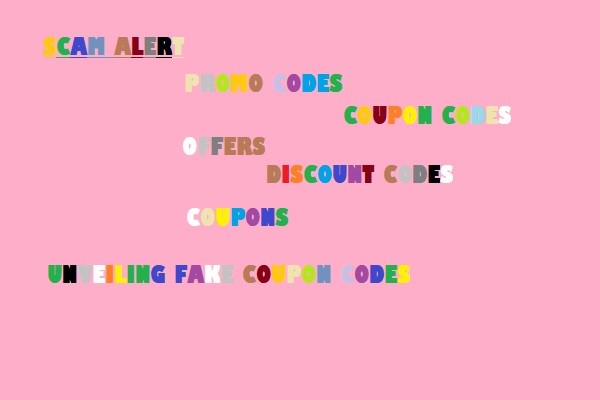
Shopping online often follows a familiar routine: just before
you finalize your purchase, it's time to hunt for a coupon code. Sometimes, the
store you're shopping at doesn't prominently display any available discounts.
So, you cast a wider net by searching for terms like "Target promo
codes" or "Target coupon codes" on Google. A slew of results
pops up, featuring several well-known and trustworthy sites. And there it is a
promising promo code offering a tempting 25% off. Score!
Or perhaps not. You eagerly click through on the offer, enter
the code at checkout, and then. the dreaded "not valid" message
appears. You try switching up your items, attempting the code again, only to be
met with the same disappointing outcome. Soon enough, it dawns on you this
coupon code is a dud. No savings to be had, just wasted time.
Why Fake
Coupon Codes Exist
Fake and non-working coupons have become a common issue in
the online search and e-commerce landscape. Affiliate revenue, which is the
money earned by a site when a shopper clicks through on an offer or product
link, has long been a key source of income for publishing sites.
In recent years, media sites have expanded their revenue
streams by hosting third-party coupon offers on their platforms. However, these
sites' editors often do not verify, check, or maintain these third-party
offers. Instead, they simply provide a platform for these offers, earning
revenue and attracting shopping-related search traffic due to their reputable
standing, which ensures their coupon hubs rank high in search engine result
pages.
When a third party publishes an expired or fake coupon code,
it often remains on the host's coupon hub page, waiting to be clicked on by
unsuspecting shoppers. Even if the code doesn't work, some shoppers might still
proceed with their purchase, allowing money to be made on the transaction.
Google is on the verge of tightening regulations on hosting
un-vetted third-party coupons. However, fake coupon codes are likely to persist
in some form within the online ecosystem. Therefore, it's crucial for shoppers
to be able to identify these fakes to avoid wasting time and experiencing disappointment.
How to Know
if a Coupon Is Fake
Even the savviest bargain hunters can fall victim to tricks.
However, our editorial team, with years of experience sourcing deals for our
articles, roundups, and newsletter, has developed a keen eye for authentic
bargains. Here are some indicators that the coupon code you stumbled upon might
be fake:
It's Too
Good to Be True
There's a reason you found yourself scouring for a coupon
code for that particular retailer. Promo codes for such retailers simply don't
exist, or are exceedingly rare. Retail giants like Target, Wayfair, Walmart,
and even many luxury brands, seldom offer promo codes to the general public.
For instance, Target emphasizes its exclusive Target Circle
offers for logged-in and app users. Similarly, Walmart is known for its
renowned Rollbacks on select products.
If you're a seasoned bargain hunter, you'll become familiar
with which stores consistently provide promo codes and which ones don't.
However, if you can't find codes on the retailer's own site and have to resort
to searching elsewhere, exercise caution.
The same caution applies to promo codes offering unusually
high discounts. Retailers typically offer promo codes as an additional perk,
usually providing discounts of around 10% to 20%. Therefore, if you come across
a promo code offering 50% or 75% off, it's wise to be skeptical. Even an offer
of 25% off warrants some scrutiny.
The Promo
Code is Really Vague
Most coupons come with fine print, and if the one you're
eyeing doesn't, it might be a fake. Consider this offer we recently stumbled
upon for Wayfair on a coupon site:
The language used is broad and vague. There's no mention of
an expiration date, exclusions, or a minimum spending requirement, and very
little detail provided. Clicking through leads to Wayfair's site for
contractors and working professionals, further indicating that this offer
likely won't apply to regular shoppers.
For comparison,
take a look at this offer:
It's packed with fine print, including an expiration date,
details on the coupon-stacking policy, and clear exclusions. This is a positive
sign it indicates that the offer has been thoroughly researched and verified.
While it may not apply to every item, you can easily discern what it does apply
to.
The Promo
Code Seems Personalized
This isn't necessarily an indication of a fake coupon, but
rather a sign that it may not be applicable to you. Retailers frequently send
promo codes to members of their mailing lists, which are often one-time-use
only and customized for individual users. These codes typically consist of long
strings of letters and numbers.
If a recipient tries to submit such a personalized code to a
coupon site, it won't work for anyone else. While CartMeFirst does accept
user-submitted codes, we meticulously moderate and review each offer.
Ultimately,
a fake coupon on an otherwise reputable site is unlikely to compromise your
identity or deceive you with counterfeit products. However, both time and money
are valuable commodities, and you wouldn't want to squander either. Learn more
about how we diligently verify the offers and coupon codes on CartMeFirst.
By Amliya Eva
By Amliya Eva
By Amliya Eva
STAY UP TO DATE WITH OUR BLOGS